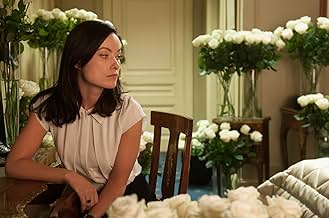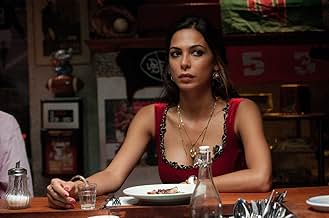VALUTAZIONE IMDb
6,3/10
29.970
LA TUA VALUTAZIONE
Tre storie d'amore che coinvolgono tre coppie in tre città: Roma, Parigi e New York.Tre storie d'amore che coinvolgono tre coppie in tre città: Roma, Parigi e New York.Tre storie d'amore che coinvolgono tre coppie in tre città: Roma, Parigi e New York.
- Regia
- Sceneggiatura
- Star
- Premi
- 1 vittoria e 1 candidatura in totale
Recensioni in evidenza
Paul Haggis both wrote and directed this very long movie (137 minutes) that plays with our minds in a way not dissimilar to his most famous similar film CRASH. The quilted story takes patience and close attention to paste each of the three running stories together – three (at times augmented) couples whose lives are altered in some way by a child – drowning, abusive by placing in a plastic bag, a conveniently imagined child – and it all ties together with slips of paper, pages of novels, paintings and other threads spread around Paris, Rome, and New York.
'Michael (Liam Neeson) is a Pulitzer Prize-winning fiction author who has sequestered himself in a hotel suite in Paris to finish his latest book. He recently left his wife, Elaine (Kim Basinger), and is having a tempestuous affair with Anna (Olivia Wilde), an ambitious young journalist who wants to write and publish fiction. At the same time, Scott (Adrien Brody), a shady American 'clothing designer' businessman, is in Italy to steal designs from fashion houses. Hating everything Italian, Scott wanders into the Café American with barkeep Marco (Riccardo Scamarcio) in search of something familiar to eat. There, he meets Monika (Moran Atias), a beautiful Romanian woman, who is about to be reunited with her young daughter. When the money she has saved to pay her daughter's smuggler Carlo (Viinico Marchioni) has stolen, Scott feels compelled to help. They take off together for a dangerous town in Southern Italy, where Scott starts to suspect that he is the patsy in an elaborate con game. Julia (Mila Kunis), an ex-soap opera actress, is caught in a custody battle for her 6 year-old son with her ex-husband Rick (James Franco), a famous New York artist. With her support cut off and her legal costs ruinous, Julia is reduced to working as a maid in the same upscale boutique hotel where she was once a frequent guest. Julia's lawyer Theresa (Maria Bello) has secured Julia one final chance to change the court's mind and be reunited with the child she loves. Rick's current girlfriend Sam (Loan Chabanol) is a compassionate onlooker.'
With a cast such as this the film works as well as it can with such obtuse twists and turns involving each of the three couples. The film 'feels' like it wants to be wonderful, but it just plods along too slowly to make us care very much about this odd groups of maladjusted misfits.
'Michael (Liam Neeson) is a Pulitzer Prize-winning fiction author who has sequestered himself in a hotel suite in Paris to finish his latest book. He recently left his wife, Elaine (Kim Basinger), and is having a tempestuous affair with Anna (Olivia Wilde), an ambitious young journalist who wants to write and publish fiction. At the same time, Scott (Adrien Brody), a shady American 'clothing designer' businessman, is in Italy to steal designs from fashion houses. Hating everything Italian, Scott wanders into the Café American with barkeep Marco (Riccardo Scamarcio) in search of something familiar to eat. There, he meets Monika (Moran Atias), a beautiful Romanian woman, who is about to be reunited with her young daughter. When the money she has saved to pay her daughter's smuggler Carlo (Viinico Marchioni) has stolen, Scott feels compelled to help. They take off together for a dangerous town in Southern Italy, where Scott starts to suspect that he is the patsy in an elaborate con game. Julia (Mila Kunis), an ex-soap opera actress, is caught in a custody battle for her 6 year-old son with her ex-husband Rick (James Franco), a famous New York artist. With her support cut off and her legal costs ruinous, Julia is reduced to working as a maid in the same upscale boutique hotel where she was once a frequent guest. Julia's lawyer Theresa (Maria Bello) has secured Julia one final chance to change the court's mind and be reunited with the child she loves. Rick's current girlfriend Sam (Loan Chabanol) is a compassionate onlooker.'
With a cast such as this the film works as well as it can with such obtuse twists and turns involving each of the three couples. The film 'feels' like it wants to be wonderful, but it just plods along too slowly to make us care very much about this odd groups of maladjusted misfits.
Third Person seeks to explore the betrayal of trust—the betrayal of fidelity and friendship. Paul Haggis, the director, has made a career out of making films that interweave numerous story lines. In this case, Liam Neeson, Olivia Wilde, Adrien Brody, Mila Kunis, and James Franco all comprise a wonderful ensemble that demands a range of powerful emotions to drive this story through its incessant melodrama (no negative connotation applied). The narrative here focuses on the romantic relationships and affairs that unfortunately still plague society and humanity's untamable nature. I'm sure we all know the implication of the film's title ("Third Person"), and with that, the drama goes on an almost two-and-a-half-hour drive through tense dialogue, flirtation, and sexy teases.
The movie teases and teases but never seems to reach the climax that its lengthy build-up continually suggests. Its first hour is fairly compelling in its set-up, deliberately introducing the audience to the exact predicament and its hapless participants. The plot over the rest of the film unravels quite cryptically, as well as in a manner that might appear heavily contrived to many viewers. There is a certain degree to which a suspension of belief should absolutely be mustered upon entering this picture. Aside from the contrivances, moments exist within that play to extreme dramatic effect but actually lead to a whole lot of nothing. After a great deal of meticulous development, a character screams and terrorizes a room out of realized anger as a tragic score plays to the segment's tune even though that scene essentially has no consequence in the sequences that follow (the character simply returns to a former state) as if the filmmaker was stylishly proceeding towards tragedy and quickly mopping up soon thereafter.
The actors themselves do a fantastic job and glue us to the screen albeit the script's occasional muddling of the conflict at hand. Adrien Brody, in my opinion, is the standout here, possessing a complex personality that battles between moral decisions and his wild desires. The writing in the first few scenes of his arc—we find him in a bar having a natural conversation with a mysterious woman (Moran Atias) as we immediately discern his dislike for foreign environments (particularly Italy) and his highly talkative, forceful nature. Olivia Wilde and Liam Neeson share the screen in probably the most compelling storyline where Neeson's strong infatuation for Wilde lends itself to perfidy and constant ridicule. Wilde's character plays a hard-to-get, but incredibly seductive, "sexpot" who tests Neeson's true loyalty to her while he starts to construct his next novel. Mila Kunis' part of the tale is definitely the least intriguing in its somewhat clichéd essence— she's bouncing from job to job, barely able to pay her monthly bills and struggling to reclaim her kid who was taken from her based on accusations of abuse.
Like I said, all of these individual threads in an interlocking story initially engross, but then, Third Person starts to drag on and on. It sits at a runtime of 2 hours and 17 minutes but honestly feels like it's reaching the 3-hour mark. The connection between these separate stories begins to materialize the further we advance into the plot while also shadowing it with plenty of confusion at the same time. The last scene is a head-scratcher in a bad way. You're scratching your head because that "da dumb" twist moment unintentionally goes over everyone's head and falls flat in its execution. So, wait: how are they exactly connected thematically and emotionally? All I witnessed was a multitude of contrivances that saw these characters crossing each other's paths for a few seconds. Of course, there's a reason to all this once the very end comes to fruition, but the point of the entire ordeal sorely misses its mark. There's too much going on with the quick cutting intensifying as we progress, and none of the arcs conclude satisfyingly.
With that being said, I still respect Haggis' ambition and his ventures into such heart-rending tales. Contrary to general reception, I genuinely enjoyed Crash, and now, I most likely find myself enjoying Third Person more than most as well. It's primarily absorbing throughout, just a tad bit too long and woolly.
The movie teases and teases but never seems to reach the climax that its lengthy build-up continually suggests. Its first hour is fairly compelling in its set-up, deliberately introducing the audience to the exact predicament and its hapless participants. The plot over the rest of the film unravels quite cryptically, as well as in a manner that might appear heavily contrived to many viewers. There is a certain degree to which a suspension of belief should absolutely be mustered upon entering this picture. Aside from the contrivances, moments exist within that play to extreme dramatic effect but actually lead to a whole lot of nothing. After a great deal of meticulous development, a character screams and terrorizes a room out of realized anger as a tragic score plays to the segment's tune even though that scene essentially has no consequence in the sequences that follow (the character simply returns to a former state) as if the filmmaker was stylishly proceeding towards tragedy and quickly mopping up soon thereafter.
The actors themselves do a fantastic job and glue us to the screen albeit the script's occasional muddling of the conflict at hand. Adrien Brody, in my opinion, is the standout here, possessing a complex personality that battles between moral decisions and his wild desires. The writing in the first few scenes of his arc—we find him in a bar having a natural conversation with a mysterious woman (Moran Atias) as we immediately discern his dislike for foreign environments (particularly Italy) and his highly talkative, forceful nature. Olivia Wilde and Liam Neeson share the screen in probably the most compelling storyline where Neeson's strong infatuation for Wilde lends itself to perfidy and constant ridicule. Wilde's character plays a hard-to-get, but incredibly seductive, "sexpot" who tests Neeson's true loyalty to her while he starts to construct his next novel. Mila Kunis' part of the tale is definitely the least intriguing in its somewhat clichéd essence— she's bouncing from job to job, barely able to pay her monthly bills and struggling to reclaim her kid who was taken from her based on accusations of abuse.
Like I said, all of these individual threads in an interlocking story initially engross, but then, Third Person starts to drag on and on. It sits at a runtime of 2 hours and 17 minutes but honestly feels like it's reaching the 3-hour mark. The connection between these separate stories begins to materialize the further we advance into the plot while also shadowing it with plenty of confusion at the same time. The last scene is a head-scratcher in a bad way. You're scratching your head because that "da dumb" twist moment unintentionally goes over everyone's head and falls flat in its execution. So, wait: how are they exactly connected thematically and emotionally? All I witnessed was a multitude of contrivances that saw these characters crossing each other's paths for a few seconds. Of course, there's a reason to all this once the very end comes to fruition, but the point of the entire ordeal sorely misses its mark. There's too much going on with the quick cutting intensifying as we progress, and none of the arcs conclude satisfyingly.
With that being said, I still respect Haggis' ambition and his ventures into such heart-rending tales. Contrary to general reception, I genuinely enjoyed Crash, and now, I most likely find myself enjoying Third Person more than most as well. It's primarily absorbing throughout, just a tad bit too long and woolly.
Paul Haggis is best known as the director of the movie "Crash", which was the controversial winner of the Oscar for Best Picture in 2006 over its closest rival "Brokeback Mountain." Haggis is also the first screenwriter to win Oscars for Writing for two consecutive years, "Million Dollar Baby" in 2005 and "Crash" in 2006. It was the name of Paul Haggis that drew me to check out "Third Person" without knowing anything else about it.
Like "Crash", "Third Person" is also a film with multiple story lines. I have liked movies like this since I have seen "Amores Perros" and "21 Grams." I have admired how the scriptwriter managed to clearly tell three or four stories and then connect them to each other with an overarching bigger story.
Michael (Liam Neeson) is an aging Pulitzer-prize winning author who left his wife Elaine (Kim Basinger) and is now having an affair with a much younger Anna (Olivia Wilde) in Paris. Scott (Adrien Brody) is an unscrupulous clothing businessman who gets entangled with the shady financial problems of a gypsy-like local lady Monika (Moran Atias) in Rome. Julia (Mila Kunis) is a poor divorcée who lost custody of her young son to her estranged husband Rick (James Franco) because of an unfortunate accident with a plastic laundry bag.
It was good to see Liam Neeson again in a straight drama, not in another action vehicle that he is wont to do lately. Olivia Wilde is daring, gorgeous and smart, the perfect femme fatale. Mila Kunis stands out in a very serious dramatic role. Her brutally-emotional confrontation scene with James Franco was amazingly acted out. In terms of romantic chemistry though, the best was between Adrien Brody and Moran Atias. Their story line was interesting on its own, but seemed furthest off from any connection with the other two stories.
The underlying issue and conflict in all three stories was about trust. Anna's bizarre behavior is driving Michael nuts about her loyalty. On the other hand, Michael is using their stormy relationship as the subject of his book seemingly without Anna's consent. Monika's connection with a sleazy extortionist has Scott doubting her innocence. Rick cannot trust Julia anymore with even basic visitation rights to their son.
Even at the two hour mark, the three stories seem to be slowly losing their steam and getting nowhere without any detectable connection to each other. However, just as I was losing hope as to this film's ability to end properly, suddenly comes a most surprising development that actually manages to solidify the three disparate segments of this film into a single coherent whole. Paul Haggis has done it again to weave his magic with this inventive type of story telling via film.
Like "Crash", "Third Person" is also a film with multiple story lines. I have liked movies like this since I have seen "Amores Perros" and "21 Grams." I have admired how the scriptwriter managed to clearly tell three or four stories and then connect them to each other with an overarching bigger story.
Michael (Liam Neeson) is an aging Pulitzer-prize winning author who left his wife Elaine (Kim Basinger) and is now having an affair with a much younger Anna (Olivia Wilde) in Paris. Scott (Adrien Brody) is an unscrupulous clothing businessman who gets entangled with the shady financial problems of a gypsy-like local lady Monika (Moran Atias) in Rome. Julia (Mila Kunis) is a poor divorcée who lost custody of her young son to her estranged husband Rick (James Franco) because of an unfortunate accident with a plastic laundry bag.
It was good to see Liam Neeson again in a straight drama, not in another action vehicle that he is wont to do lately. Olivia Wilde is daring, gorgeous and smart, the perfect femme fatale. Mila Kunis stands out in a very serious dramatic role. Her brutally-emotional confrontation scene with James Franco was amazingly acted out. In terms of romantic chemistry though, the best was between Adrien Brody and Moran Atias. Their story line was interesting on its own, but seemed furthest off from any connection with the other two stories.
The underlying issue and conflict in all three stories was about trust. Anna's bizarre behavior is driving Michael nuts about her loyalty. On the other hand, Michael is using their stormy relationship as the subject of his book seemingly without Anna's consent. Monika's connection with a sleazy extortionist has Scott doubting her innocence. Rick cannot trust Julia anymore with even basic visitation rights to their son.
Even at the two hour mark, the three stories seem to be slowly losing their steam and getting nowhere without any detectable connection to each other. However, just as I was losing hope as to this film's ability to end properly, suddenly comes a most surprising development that actually manages to solidify the three disparate segments of this film into a single coherent whole. Paul Haggis has done it again to weave his magic with this inventive type of story telling via film.
Liam Neeson plays Michael, a writer. His eyes are curiously and deceptively filled with feeling and warmth even as his character plays out as a "sociopath" who has trouble feeling anything genuine toward other people. Yet, he is obsessed with the creation of emotion, as if the suspension of love in mid-air between two people is his home and friend. His mind is similarly disembodied. He feels need for love, especially when he is deprived of his lover's presence, but the actual presence of that body works to quickly diffuse the passion that is powerful in theory but thrives on it's staying in that theoretical strata. Michael has found a way, through his writing, to cope with this absurd existence. He finds the answer to his addiction in the creation of fiction using people in real life. He lets life naturally play out around him, provoking into being both the subtle and blatant forms of passion, romanticism, divine emotion and drama, then filters these experiences onto paper, choosing only the best parts, and throwing away the rest. Including any irrelevant parts of himself. In this way, he chooses to live his own life in a half-existence, desperately clinging to the divinity of love while denying the bitter absence of his ability to express it genuinely. 'Genuinely' is the key word here. Surely delivering hundreds of white roses to the bedroom of his lover Anna, (played by Olivia Wilde), is beyond romantic. But for Michael it is an act of intellect, not passion. It is a tool used to evoke the necessary catalyst, letting life display action, and funneling the magic into his own words.
Anna is a woman and entity that is completely unique in relation to anyone else in the movie and expresses a shade of mentality that I've never seen in a film so clearly. Within the life spans of each character prior to the timeline of the film is a catastrophic event involving either children or themselves as children. This is a line of storytelling that is evenly and thoroughly paved, on which it is typically easy to carry an audience. Because of such and such event in one's childhood, this character turned out to be this and this. The audience willingly nods to almost any such explanation that follows this logic; the more messed up, the more believable. Anna's case certainly gives her some degree of excusability in this story, though that concept is for another time and another debate. Incredibly, this event, though strong and controversial, does not outshine the vivid expression of her mentality through her actions prior to the unveiling of this childhood/adulthood disaster. She is blunt, cold and incredibly sadistic when it comes to attacking Michael. She is spontaneous, child-like and in considerable anguish. She is excited by the same game that Michael is, and this is what holds them together through the poisonous collisions with the sterility of every-day life. There game is fun, sexy. The fact that in their spontaneous role-play they are acutely aware of the other's true mentality builds a mutual sexual excitement; they can't wait to see how the story will turn out this time, whether it leaves Anna naked in the hallway of a hotel, or hundreds of flowers left in her empty room. The plain of existence could go on exponentially from here in satisfaction for Michael, but for Anna there is a step further down that makes her existence with Michael inhospitable. She is aware and ashamed of her acidic behavior towards Michael, and she has settled into a resolution of consistent punishment for those actions; at least she is trying very hard to. Michael makes this wish impossible in his equally consistent forgiveness for the sake of not losing his muse. As a result, Anna is catapulted into despair as she does not receive the intake of pain and rebuke she expects, resolute that she in no way deserves forgiveness or love; both of which she has long since destroyed within herself. Confronted with a room full of roses, she is helpless to respond in any way other than crawling, slowly and humbly, back to her indestructible lover...
http://funkyforestfirstcontact.wordpress.com/
Anna is a woman and entity that is completely unique in relation to anyone else in the movie and expresses a shade of mentality that I've never seen in a film so clearly. Within the life spans of each character prior to the timeline of the film is a catastrophic event involving either children or themselves as children. This is a line of storytelling that is evenly and thoroughly paved, on which it is typically easy to carry an audience. Because of such and such event in one's childhood, this character turned out to be this and this. The audience willingly nods to almost any such explanation that follows this logic; the more messed up, the more believable. Anna's case certainly gives her some degree of excusability in this story, though that concept is for another time and another debate. Incredibly, this event, though strong and controversial, does not outshine the vivid expression of her mentality through her actions prior to the unveiling of this childhood/adulthood disaster. She is blunt, cold and incredibly sadistic when it comes to attacking Michael. She is spontaneous, child-like and in considerable anguish. She is excited by the same game that Michael is, and this is what holds them together through the poisonous collisions with the sterility of every-day life. There game is fun, sexy. The fact that in their spontaneous role-play they are acutely aware of the other's true mentality builds a mutual sexual excitement; they can't wait to see how the story will turn out this time, whether it leaves Anna naked in the hallway of a hotel, or hundreds of flowers left in her empty room. The plain of existence could go on exponentially from here in satisfaction for Michael, but for Anna there is a step further down that makes her existence with Michael inhospitable. She is aware and ashamed of her acidic behavior towards Michael, and she has settled into a resolution of consistent punishment for those actions; at least she is trying very hard to. Michael makes this wish impossible in his equally consistent forgiveness for the sake of not losing his muse. As a result, Anna is catapulted into despair as she does not receive the intake of pain and rebuke she expects, resolute that she in no way deserves forgiveness or love; both of which she has long since destroyed within herself. Confronted with a room full of roses, she is helpless to respond in any way other than crawling, slowly and humbly, back to her indestructible lover...
http://funkyforestfirstcontact.wordpress.com/
This is an excellent human drama. Any of the negative reviews you see about it are basically coming from a "dumbing down" stance. Like . . (duh) WHY is this director trying to be so intellectooul?" It's a damned clever piece of work, and we don't get that much any more in this age of comic book movies.
It is also VERY moving, and finely acted. Watching Olivia Wilde's character, I kept thinking, wow such a "borderline" case, then we find out precisely WHY she's such.
You should go see this and bring your brain with you. Don't tell anyone else what it's about or what the spoilers are, and I'm not either.
"White" - the color of trust, and belief, and lies.
It is also VERY moving, and finely acted. Watching Olivia Wilde's character, I kept thinking, wow such a "borderline" case, then we find out precisely WHY she's such.
You should go see this and bring your brain with you. Don't tell anyone else what it's about or what the spoilers are, and I'm not either.
"White" - the color of trust, and belief, and lies.
Lo sapevi?
- QuizJames Franco said that Ashton Kutcher, Mila Kunis' husband (fiancé then), couldn't endure watching the scene where Franco had to slap Kunis' face and drag her across the floor. Kutcher had to leave the room during the shooting. "I mean, it wasn't my idea!! It was the script!" Franco said. Further to the close of this scene, when dragging Kunis out across the rug, Franco's stumble at the end was unscripted: but director Haggis felt it suited the scene's intensity so left it in the final take. [Latter direction reference from director's own DVD commentary]
- BlooperWhen Olivia Wilde's character is locked out of Liam Neeson's character hotel room, she is completely naked and in such conditions she runs down the corridor and stairs towards her own room. When she enters it, she can be seen wearing knickers.
- Curiosità sui creditiThe opening as well as the first part of the ending credits share the same graphic pattern style as the lower parts of the glass partitions in the apartment of Franco's character.
- ConnessioniFeatured in Film '72: Episodio datato 12 novembre 2014 (2014)
- Colonne sonoreChiaro
Performed by Gigi D'Alessio
Courtesy of GGD Srl.
Written by Gigi D'Alessio (as Luigi D'Alessio) and Valentina D'Agostina
Published by Warner Chappell Music Italiana Srl and GGD Edizioni Srl
All Rights Administered by Warner Chappell Music Italiana Srl
I più visti
Accedi per valutare e creare un elenco di titoli salvati per ottenere consigli personalizzati
Dettagli
- Data di uscita
- Paesi di origine
- Sito ufficiale
- Lingue
- Celebre anche come
- Amores infieles
- Luoghi delle riprese
- Aziende produttrici
- Vedi altri crediti dell’azienda su IMDbPro
Botteghino
- Budget
- 28.000.000 USD (previsto)
- Lordo Stati Uniti e Canada
- 1.021.398 USD
- Fine settimana di apertura Stati Uniti e Canada
- 38.856 USD
- 22 giu 2014
- Lordo in tutto il mondo
- 2.624.761 USD
- Tempo di esecuzione2 ore 17 minuti
- Colore
- Mix di suoni
- Proporzioni
- 2.35 : 1
Contribuisci a questa pagina
Suggerisci una modifica o aggiungi i contenuti mancanti








































